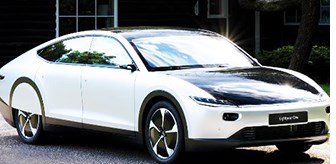Startup Touts Long-Range EV with Large Solar Array
Dutch startup Lightyear says its electric vehicle has a range of about 450 miles, about 45% of which is derived from its large array of solar panels.
#hybrid
Dutch startup Lightyear says its electric vehicle has a range of about 450 miles, about 45% of which is derived from its large array of solar panels.
The company took the wraps off the prototype Lightyear One sedan today in Katwijk, Netherlands. Lightyear aims to sell 500 of the cars, which will be base-priced at €119,000 ($136,000), starting in 2021.

The One five-seater sports a sleek, lightweight design that features a 54 sq-ft solar panel array across the hood, roof and rear window. Lightyear claims the panels are 20% more efficient than traditional solar arrays used for supplemental power in other vehicles. The One panels also are strong enough for an adult to walk on them without causing any denting, according to the carmaker.
Power comes from four independent in-wheel motors. Details about the battery pack and other technical specifications haven’t been disclosed.
In addition to the One, Lightyear says it is working on several lower-cost EVs. These vehicles will be geared toward car-sharing applications, and are expected to have high levels of autonomy.
The company was founded in 2016 by engineering students from the Technical University of Eindhoven, who won the Bridgestone World Solar Challenge. Lightyear now has more than 100 employees, including former Tesla and Ferrari engineers.
The company says it has raised more €20 million from reservations, investments and grants, which has been used to help fund development and purchase a small production facility.
A video about the Lightyear One can be viewed HERE.
RELATED CONTENT
-
Flying Car Flight of Fancy Gets Real
People have been dreaming about flying cars since the early days of the auto and aircraft industries.
-
Report Predicts Limited Impact of Autonomous Tech on Professional Drivers
A new study says autonomous vehicles will displace some taxi drivers but have only a modest impact on the number of truck driver jobs over the next 10 years.
-
Kroger Tests Self-Driving Grocery Delivery Service
The Kroger Co. and Silicon Valley startup Nuro launched a pilot program for autonomous grocery delivery this week in Scottsdale, Ariz.








